- Home
- Deborah Blum
The Ghost Hunters Page 4
The Ghost Hunters Read online
Page 4
The Davenports may have been charlatans, but they were charming and capable ones. People liked them—to the point, perhaps, that they even trusted the performers’ explanations of spirit mischief. Aloof and autocratic university scientists with their rational cynicism seemed far less appealing.
MANY YEARS LATER, William James marveled at the ineffectiveness of such scientific strikes against the supernatural. “How often has ‘Science’ killed off all spook philosophy, laid ghosts and raps and ‘telepathy’ away underground as so much popular delusion?” he would wonder ironically. As James noted, the ghosts kept coming back, the visions yet glimmered, the voices yet sounded. No matter how many times scientists evoked mental illness, dreams, fantasy, and stupidity as explanations for bumps in the night, people kept reporting them as though they were real.
Go back in history, James pointed out, and “you will find there was never a time when these things were not reported just as abundantly as they are today.” Ghosts drifted like smoke through the pyramids of Egypt. Smoldering demons climbed out of fires in ancient Africa. Spirits walked with native hunters in the American forests, guiding the arrows with their invisible hands.
“The phenomena are there,” he wrote, “lying broadcast over the surface of history.” The question for him had never been whether people saw—or thought they saw—ghosts. The question had always been what to do with such odd reports, how to classify such irregular events, where to place them in our orderly descriptions of how the world worked. Or maybe it was better described as a problem, one that didn’t fit in such organized systems.
“The ideal of every science is that of a closed and completed system of truth,” James acknowledged. If supernatural events did not match the categories of the scientific system they “must be held untrue.” James admired the efficiency of the “scientific” approach to the spiritual murkiness. “It is far better tactics, if you wish to get rid of mystery, to brand the narratives themselves as unworthy of trust,” James wrote. But while he agreed that most so-called supernatural events were suspect, he worried that scientists stayed deliberately blind to the rare credible ones, that researchers might be ignoring “a natural kind of fact of which we do not yet know the full extent.”
And he worried too about the larger effect of such prejudice on the way people viewed science itself. “Thousands of sensitive organizations in the United States today live as steadily in the light of these experiences, and are as indifferent to modern science, as if they lived in Bohemia in the twelfth century. They are indifferent to science, because science is so callously indifferent to their experiences.”
If scientists did not afford some respect to the beliefs of the lay public, James warned, there was little reason for the public to respect the pronouncements of science.
BY THE TIME William James was thirteen years old, he had attended almost a dozen different New York schools. By 1857, the year Harvard took on the Davenports, the James family had been back in Europe for two years. Their father had decided on the more sophisticated, “sensuous” advantages of a European education. He took the family to Switzerland, but didn’t like the schools there either. Then London. Then France, where they moved five times in the next two years. Then back across the Atlantic to Newport, Rhode Island. They stayed three months before moving back to Switzerland. There William studied painting, and Henry was sent to a polytechnic school. Then Germany for a year. Then back to Newport.
It was gypsy traveling and scattershot education, and every one of the James children considered it destructive. Henry James Jr. deliberately omitted two of the moves from his adult autobiography to make the family appear more normal. Alice grew to be an unstable and bitter woman. “If I had had any education,” she wondered once, “would I be more or less of a fool than I am?”
In 1861 William enrolled at Harvard. The university would serve as his first real anchor, mooring him against the erratic winds of home life and the wilder storm blowing across the country, the bloody howl of the Civil War. He’d intended to become a soldier, signing up at the age of nineteen as a volunteer with the Newport Artillery Company, making himself available for state militia recruitment. Almost until that day, Henry Sr. had refused to consider allowing his eldest son to leave home for university. Now he told William to start immediately. He wanted Henry Jr. there as well. His two younger sons he encouraged off to war the following year, making it obvious, as he would throughout their lives, that he treasured his older sons far more. “I’ve had a firm grip upon the coat tails of my Willy and Harry, who both vituperate me beyond measure because I won’t let them go” to fight, James Sr. wrote to a friend.
The war—and their father’s response to it—would leave a legacy of bitterness in the James family, echoing the lingering damage across the country. The older brothers long harbored guilt, and the younger ones a sense of rejection. It was years later, toward the end of the nineteenth century, before it was clear that William James had made his peace with himself and his kin. In a speech honoring the Civil War dead, he praised the individuals, the soldiers like his brothers, but not the war itself. Nations, James said simply, are not saved by wars. They are saved, he said, by “acts without external picturesqueness; by speaking, writing, voting reasonably; by smiting corruption swiftly; by good temper between parties—by people knowing true men when they see them, preferring them as leaders to rabid partisans and empty quacks.”
He spoke in memory of his brother Wilkie, dead at the age of thirty-eight, largely due to the long-term crippling damage of battle wounds. But he spoke for himself too. Rabid partisans and empty quacks? William James could never abide people who pretended that there could be an honorable stand without honesty behind it.
Now, don’t, sir! Don’t expose me! Just this once!
This was the first and only time, I’ll swear,—
Look at me,—see, I kneel,—the only time,
I swear, I ever cheated ...
The year was 1864, the Civil War yet burned in the United States, and William James was in his third year at Harvard when Robert Browning published that bitter portrait of the archetypal professional medium.
Browning’s wife, Elizabeth, had died three years earlier, after years of illness. He admitted that he would not have published the poem during her lifetime. She was too ardent a believer, laughingly describing herself once as a follower of every goblin story. “Smile,” she wrote to her sister, “but such things are so indeed.”
Browning indulged her, his lovely, hopeful, delicate wife, with whom he had eloped to Italy in 1848. Theirs was one of society’s more famous romances—the young Robert Browning courting the acclaimed poet Elizabeth Barrett. Gossips whispered of her possessive father’s fury, their flight in the middle of the night, their romantic idyll in Italy. The marriage lasted thirteen years, until her death in 1861. She wrote some of her best poetry when they were together, including Sonnets from the Portuguese, with all its soaring romanticism and famous lines: “How do I love thee? Let me count the ways.”
Browning himself wrote only sporadically during the marriage. After her death, though, he threw himself into a series of intense and emotional story-poems, collected in 1864 into a book called Dramatis Personae. Among them, the poem “Mr. Sludge, the Medium” stood out like a thistle in a cluster of red velvet roses, a spiky blast of rage in the midst of love and longing and loss.
In Browning’s poem, Mr. Sludge first begs to have his mediumistic tricks kept secret and then defiantly confesses anyway: he hired children to listen at the keyhole and pass along information about clients. He made ghost hands appear above the table by fixing padded gloves onto a rod attached to his shoes. He used phosphorus to make spirit lights glow during his seances.
To turn, shove, tilt a table, crack your joints,
Manage your feet, dispose your hands aright,
Work wires that twitch the curtains, play the glove
At end o’your slipper,—then put out the lights.
As the medi
um trade grew, its flaws and its frauds had become more obvious. The Davenport Brothers, after their popular triumph over Harvard academics, had brought their cabinet show to England, only to be caught in some obvious chicanery with ropes. In Liverpool, an angry audience had smashed their cabinet to pieces, later selling the splinters as souvenirs. Ira Davenport called it “a nauseating example to all foreigners of ‘ow the average Englishman does things at ’ome”, and the brothers took their act to the Continent.
But later Ira would reveal many of their better rope tricks to the magician Harry Houdini. The fact was, too many actual Mr. Sludges existed, and too many of them shared their secrets. Professional magicians and actors took to the stage, performing to packed houses, showing that they too could conjure like the Davenports, or, as one theater poster declared, could reproduce “All the Tricks of the Spirit Conjurers.”
One female medium was found to have an ingenious wire dummy, covered with a thin skin of rubber, which could be inflated during a dark séance to resemble the “spirit” form of a small child. Deflated, it could be folded and worn as a stylish bustle, neatly concealed in her skirts. Others hid thin packets of clothing—preferably cobweb-fine French muslin—in their undergarments. The cloth was made bright in spots by luminous oil, made of phosphorus and ether. The oil glowed only faintly in the dark, but bits of glass or paste diamond sewn into the cloth added a brighter glitter. Not surprisingly, spiritualist performers preferred to hold their seances in the dark and in their own homes. In one medium’s abode, investigators found a trapdoor under a cabinet, opening into a passage that led into a backroom that contained another trapdoor out of the building itself.
Such exposes delighted the critics of the spiritualist movements. Scientists rejoiced in what they hoped would lead to a new skepticism. And religious leaders, dismayed to find spiritualist churches the fastest-growing houses of worship, renewed their efforts to discredit the movement. In a book called Spiritualism Unveiled, a prominent theologian described spiritualists as wife beaters, sexual deviants, and anti-Christian: “They are as unlike in their moral influence as are Christ and Belial.”
For the moment, it was the latter accusation that most irked the spiritualists, and they were quick to hit back with their own perspective on the morality of the day. “Are those who play tricks and fling about instruments spirits from Heaven?” inquired one spiritualist newspaper in an impassioned editorial. “Yes, God sends them, to teach us this, if nothing more: that He has servants of all grades and tastes ready to do all kinds of work and He has here sent what you call low and harlequin spirits to a low and very sensual age.”
BUT ROBERT BROWNING wasn’t writing only about the Davenports and their ilk when he penned “Mr. Sludge.” As everyone knew—at least, everyone in literary circles—the talented, amoral, fluently devious Mr. Sludge was a barely disguised caricature of Daniel Dunglas Home.
Home had returned to England after a sweep across Europe so successful that the Roman Catholic Church charged him with witchcraft. While in Russia, he had married a young goddaughter of the tsar with due pomp (the French novelist Alexandre Dumas, author of The Three Musketeers, stood as best man, Alexei Tolstoy as groomsman). Respectability had done nothing to alter Home’s ethereal, inexplicable nature. He was “Stranger than Fiction,” according to a magazine article about him written in 1860, still widely considered the best description known of the medium—and the best counter to Browning’s long-standing dislike of the man. The magazine writer described a sitting with Home in which the medium “rose from his chair, four or five feet from the ground.... We saw his figure pass from one side of the window to the other, feet foremost, lying horizontally in the air. He spoke to us as he passed, and told us that he would then return the reverse way and re-cross the window, which he did.”
This description appeared in a new British literary magazine, The Cornhill, edited by the famously sharp-tongued writer William Makepeace Thackeray, whose 1848 novel Vanity Fair had established him as a man more than willing to skewer pretensions. Yet Thackeray not only approved the article, he wrote an editor’s note vouching for the “good faith and honorable character” of its author. Thackeray had friends in scientific circles. He had no doubt they were unhappy; he found himself accused, outright, of being complicit in the spread of spirit fraud. When confronted by one furious scientist, Thackeray simply cited his own experience: “It is all very well for you, who have probably never seen any spiritual manifestations to talk as you do; but had you seen what I have witnessed, you would hold a different opinion.”
To his believers, Home offered something that neither irate scientists nor resentful poets seemed able to counter. He boasted a flamboyant mystic appeal that the staunch mainline Protestant churches of the establishment of America and Britain—Anglicans, Episcopalians, and Methodists—neither could nor would attempt to match. Perhaps most powerfully of all, he and his counterparts offered a glimpse of possibilities through open doors that their critics—churchmen, skeptics, and scientists alike—would slam without a glance.
This was the reality that William James, scientist and scholar, saw as he made his way from his father’s shuddering haunted walls to the more steadfast halls of academia. It was the reality that he looked out upon and wondered about. Even as he built himself a respected place among the door-slammers of science, James began to think, more and more, that it was unconscionable not to look out through that portal, to see what might possibly be there.
It was past time, he thought, for science to open its mind.
2
A SPIRIT OF UNBELIEF
WHEN CHARLES DARWIN published his famous (or infamous) book On the Origin of Species in 1859, the tensions between Victorian science and religion became undeniable, obvious for all to see.
The Darwinian idea of evolution, that species take shape slowly—ruthlessly sculpted by natural selection, random mutations, and environmental pressures—was a difficult proposition for most Victorians to embrace. Even scientists hesitated at first to choose “survival of the fittest,” as it came to be called, over the Genesis creation story. There were geologists who flatly refused to accept what the fossils they found said about the age of Earth; science textbooks of the time routinely acknowledged a Creator. Mid-nineteenth-century British society was, at least on the surface, invested in a scriptural version of how the world came to be. After all, the queen was also official head of the Anglican Church.
The few people who suggested otherwise, before Darwin brought the argument fully into the open, tended to publish their works anonymously. One author who proposed that the universe might have developed according to natural laws, without divine intervention, insisted that his name remain anonymous until his death. Even so, the bishop of Oxford used his book as the foundation for a sermon condemning mid-nineteenth-century science and what he called its “mocking spirit of unbelief,” adding that the author, whoever he might be, was obviously no gentleman.
Everyone—even those who no longer insisted on a literal reading of biblical accounts of creation—could see an either/or dilemma taking shape. Choose science or faith; choose the Bible or Origin. Rightly or wrongly, there came a perception of a widening rift between incompatible, mutually exclusive realities.
IN 1858, BOTH Darwin and his fellow naturalist Alfred Russel Wallace were presented to the British scientific community as coauthors of the theory of natural selection.
Coauthors, yes. Coequals, no.
Darwin was lead author. He’d been developing and documenting his theory for more than twenty years, testing it on friends, anticipating hostility, waiting to reveal it until he could counter every-potential argument. His confidants had feared that Darwin would never quite be done, that he would polish his points into the infinite future. So Wallace was the catalyst, the spark, the innovative thinker whose independent realization of natural selection flushed the wary Darwin out of hiding.
It spoke much for the theory that two such different minds could independ
ently realize its power. Darwin turned fifty in the year he published On the Origin of Species. His background was affluent, upper class. Cambridge educated, he had served as naturalist on a sea voyage to South America and around the world. With the natural treasures he collected at stops such as the Galapagos Islands, he had returned to his English country home to classify barnacles, ponder the adaptive variety of beaks among the finches of the Galapagos, and painstakingly document his findings as he worked out his daring theory of evolution. Darwin’s nature—reclusive and self-critical-made him reluctant to engage in a public fight. Until the moment he received Wallace’s paper, Darwin was still debating the right moment to make his stand.
Wallace was thirty-five when he was declared a coauthor of the theory of evolution. He was tall, thin, energetic, with bright blue eyes framed by wire-rimmed glasses. From the middle class and largely self-educated, Wallace had become intrigued by plant species and their habitats while working in his brother’s surveying business. Leaving that work, he helped to organize two collecting expeditions, one to South America and the second to Malaysia, then known as the Malay Archipelago. His travels kept him mostly out of England between 1848 and 1862. Wallace’s paper arguing for natural selection was read in England while he was still in Malaysia, assembling a collection of more than 125,000 specimens.
Darwin and Wallace were both enormously influenced by their foreign expeditions, which Darwin illuminated in his earlier book The Voyage of the HMS Beagle. Far from England’s manicured landscapes, they explored places that displayed a wonderfully untamed diversity of life. Each man was struck by the way that species seemed to have adapted—and were still adapting—to environmental pressures. Wallace had been in Malaysia for five years, tracking the shifting patterns of plants, birds, and insects, when he first wrote to Darwin, sharing his early ideas on how species might respond to changes in location. A year later, in 1858, Wallace sent Darwin a copy of a paper, “On the Tendency of Varieties to Depart Indefinitely from the Original Type,” which detailed his new theory of natural selection.

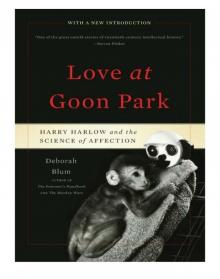 Love at Goon Park: Harry Harlow and the Science of Affection
Love at Goon Park: Harry Harlow and the Science of Affection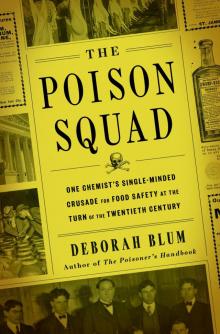 The Poison Squad
The Poison Squad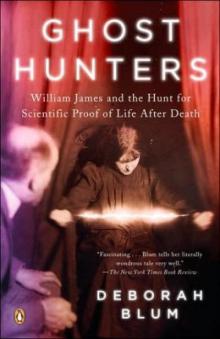 Ghost Hunters: The Victorians and the Hunt for Proof of Life After Death
Ghost Hunters: The Victorians and the Hunt for Proof of Life After Death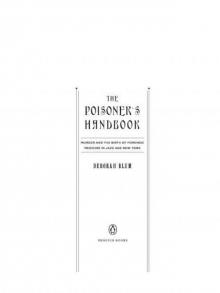 The Poisoner's Handbook
The Poisoner's Handbook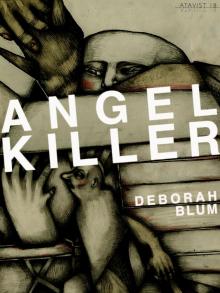 Angel Killer
Angel Killer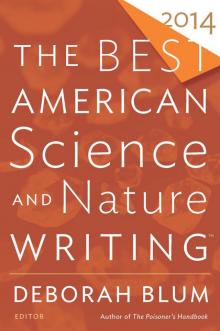 The Best American Science and Nature Writing 2014
The Best American Science and Nature Writing 2014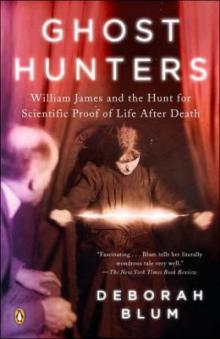 The Ghost Hunters
The Ghost Hunters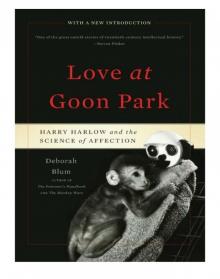 Love at Goon Park
Love at Goon Park